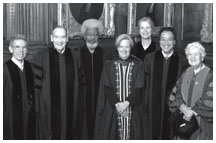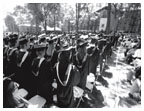Have an opinion about this issue of PAW? Please take a minute to click here and fill out our online survey. It’s an easy way to let the editors know what you like and dislike, and how you think PAW might do better. (All responses will be anonymous.) |
July 6, 2005: President's Page
With honorary degree recipients (left to right) J. Lionel Gossman, John Clifton Bogle 51, Wole Soyinka, Anne dHarnoncourt, Yo-Yo Ma, and Vera C. Rubin.
Commencement 2005 |
THE ALUMNI WEEKLY PROVIDES THESE PAGES TO THE PRESIDENT
Commencement 2005: Six Models for Us All
On May 31, in picture-perfect weather, we awarded 1,126 undergraduate and 688 graduate degrees to Princetons newest alumni, as well as six honorary degrees. Recipients of Princetons highest honor included John Clifton Bogle 51, Anne dHarnoncourt, J. Lionel Gossman, Yo-Yo Ma, Vera C. Rubin, and Wole Soyinka. Each of these men and women has made a far-reaching contribution to society, and each can and should serve as a source of inspiration for our graduates. The following are excerpts from my Commencement address that day.S.M.T.
It is a great pleasure for me to perpetuate Princetons longstanding tradition of allowing the president to have the first word at Opening Exercises and the last word at Commencement. To my fellow members of the Class of 2005, you will always have a very special significance for me, for we began our freshman year together. It seems just yesterday that I greeted you for the first time in the chapel, and told you that orange and black were about to become the dominant colors in your closets, the tiger would never be an endangered species in your mind, and the classmates around you would become your lifelong friends. All those predictions, I know, have come to pass.
In a matter of minutes you will pass through the FitzRandolph Gates for the first time as Princeton alumni. I hope you will leave with pride in your accomplishments, leavened with a sense of responsibility to use your hard-earned education to make this world a safer, more just, and more compassionate place for all its people. For this world needs you to embrace our informal motto and to serve this nation and all nationswhether you work to improve the quality of K-12 education, develop treatments for intractable diseases like Alzheimers, reduce the growing gap between rich and poor, address the deterioration in the quality of our global environment, provide inspiration and insight through the creation of art, increase economic prosperity through invention or entrepreneurship, or find peaceful solutions to divisive political problems. There are many ways to serve, but all require that you define your life in terms that are larger than yourself.
Today we conferred Princetons highest tributean honorary degreeon six individuals who have used their extraordinary talents to leave the world better than they found it. This is the reason we award honorary degreesto publicly recognize men and women who embody the very qualities of mind and character that Princeton University seeks to develop in its students. I would like to take a few moments to reflect on those qualities that I hope you will continue to cultivate once you leave this privileged place.
Vera Rubins curiosity about the natural world was simply unquenchable. She followed her passion for studying the stars with passion, determination, and courage at a time when women were actively dissuaded from becoming scientists. She refused to conform to the 1950s stereotype that presumed women do not belong in astronomy, and went on to make enduring contributions to our understanding of the universe. Discovery requires an engaged mind, a curious mind, an open mind, and a persistent mind. Through our emphasis on independent work, we have sought to provide you with the training and opportunity to follow your own passions and satisfy your own curiosities. And, of course, finishing your senior thesis or your Ph.D. dissertation called upon all the persistence and determination you could muster. May each of you continue to nurture your own unquenchable curiosity and the habit of independent thinking.
Through his sheer virtuosity as a musician, Yo-Yo Ma has brought joy to millions around the globe. What sets him apart from many of his peers, however, is his cosmopolitanism his appreciation that great music knows no geographical boundaries. Far from being restricted to the Western canon of classical music, he has introduced music lovers to the sounds of Brazil, Mongolia, and the Kalahari Desert of southern Africa, to name but a few of the musical traditions he has explored. Today the globe is truly interconnectedwhether the connections are fiber optic cable, satellite communication or jet planesand to participate fully in the 21st century, each of you will have to follow Yo-Yo Mas example and become genuinely cosmopolitan in your perspective. As a great American university with an international perspective, we take our responsibility to prepare you for this world seriously. We are working to broaden the horizons of our students through expanded study abroad and summer language training programs, the creation of the Princeton Institute for International and Regional Studies, strategic relationships with universities in other countries, and postgraduate programs such as Princeton-in-Asia, Princeton-in-Africa, and Princetonin- Latin America. I hope you will adopt the perspective of a world citizen, and live your life accordingly.
Anne dHarnoncourt has dedicated her life to collecting, conserving, and interpreting the visual arts. To wander the galleries of the Philadelphia Museum of Art is to travel through centuries and culturesfrom the ceramics of the Ming dynasty to the stained glass of medieval Europe to the abstract images of Jackson Pollack. DHarnoncourts work reminds us that the treasures of the past and the movements that have shaped them should always inform our thinking as we look to the future. A sense of humility and a deep respect for the achievements of those who have gone before us is an essential quality of an educated citizen, for as the great physicist and mathematician Isaac Newton said in a letter to Robert Hooke in 1675, øIf I have seen further than certain other men it is by standing upon the shoulders of giants.Ó All who teach and study here stand on the shoulders of those who have gone before us, for the mission of the university is not unlike a museum of artto preserve the knowledge of the past and transmit it to the next generation, while at the same time fostering the discovery of new knowledge and the creation of new art that will deepen our understanding of the human condition. I hope these twin imperatives will find full expression in your lives.
J. Lionel Gossman is a Renaissance man whose devotion to ideasas expressed in the history and literature of 17th-, 18th-, and 19th-century Europeis legendary. At the same time Professor Gossman has educated and inspired generations of students, using his lively Scottish sense of humor to set students at ease, and never allowing his scholarly attainments to intimidate or overwhelm young minds. He is the quintessential Princeton faculty memberone who is able to combine imposing erudition with a devotion to passing on that wisdom to the next generation. Those of you who intend to pursue the life of the mind and create new knowledge will be following in the footsteps of Lionel Gossman and all others who hold that knowledge is among the most important gifts that anyone can give another human being.
Nobel laureate Wole Soyinka is a celebrated writer whose plays, poems, essays, and other works have captivated readers throughout the world. He is also an outspoken voice against tyranny who has struggled to survive in a four-by-eight-foot prison cell, sustaining himself by scribbling words on cigarette packs, toilet paper, and between the lines of smuggled books. His commitment to human freedom and his belief in the fundamental dignity of every man and woman have never wavered. During your time at Princeton, many of you have been moved to speak out on issues of social and political importance, from the moral significance of a pre-emptive war, to the pros and cons of senatorial filibusters, to the needs of low-wage workers on our campus. You have encountered and debated historical injusticesfrom racial segregation to the horrors of the Holocaust. As you prepare to leave Princeton, I trust that the social and political consciousness you have cultivated here will give you the conviction and the courage to take a stand against tyranny and injustice wherever it arises.
On June 12, 1951, Jack Bogle sat where you find yourselves today. In some respects, his was a different university: women were nowhere in sight, and one of the first African-Americans to earn an undergraduate degree from Princeton, Joseph Ralph Moss, was a member of Bogles class. Yet then, as now, Princeton planted seeds that led its graduates to commit their lives to the service and well-being of others. Jack Bogle drew upon the findings of his senior thesis to change the face of the investment industry through the introduction of low-cost mutual funds, and to champion the interests of individual investors. He also drew upon the values that were nourished here. For example, since 1893 Princetons honor code has symbolized the importance we place on academic integrity requiring each member of our community to assume personal responsibility for his or her academic work. Words and ideas, after all, are the coin of the academic realm, and it is essential that we uphold the value of our currency by insisting on the highest standards. But as former Senator Bill Bradley, Class of 1965, said at an assembly on Cannon Green in 2003, øYoull need your moral compass long after youve signed your last honor pledge at Princeton. It takes a lifetime to build a reputation and only one false step to call it into doubt.Ó I am also reminded that at the same assembly, Professor John Fleming exhorted you that øIntegrity is an excellent thing. You should all have it. If perchance you lack it, you should get it as soon as possible.Ó Good advice. I hope that in years to come, the principles and standards to which you have been held here will guide all your actions. You are certain to be tested in little ways and great, but as Jack Bogle demonstrates, it is possible to pass these tests with flying colors and still achieve success.
And so, as you walk, skip, or run through the FitzRandolph Gates today,
as educated citizens of this and many other nations, I hope you will carry
forward the spirit of Princeton and all that this place has aspired to
teach youa determination to follow your passions in service to the common
good, a respect for tradition and for progress, an openness to new ideas
and a willingness to share your knowledge with others, the courage to
stand up for your beliefs and the rights of others, a global sensibility,
and a lifelong devotion to justice and freedom, all informed by the highest
standards of integrity and mutual respect. And I expect you will continue
to do as you have done at Princetonto aim high and be bold. My warmest
wishes go forward with you all! ![]()




